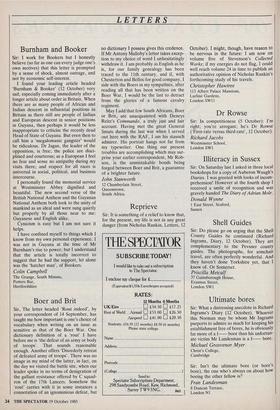Boer and Brit
Sir, The letter headed 'Rout indeed', by your correspondent of 14 September, has taught me how important is one's choice of vocabulary when writing on an issue as sensitive as that of the Boer War. One dictionary definition of a 'rout' I have before me is 'the defeat of an army or body of troops'. That sounds reasonable enough. Another offers 'Disorderly retreat of defeated army of troops'. There was no image in my mind of the latter, in fact, on the day we visited the battle site, when our leader spoke in no terms of denigration of the gallant resistance offered by C squad- ron of the 17th Lancers. Somehow the `rout' carries with it in some instances a connotation of an ignominious defeat, but no dictionary I possess gives this credence. If Mr Antony Malloby's letter takes excep- tion to my choice of word I unhesitatingly withdraw it. I am probably as English as he is, for our family genealogy has been traced to the 11th century, and if, with Chesterton and Belloc for good company, side with the Boers in my sympathies, after reading all that has been written on the Boer War, I would be the last to detract from the glories of a famous cavalry regiment.
May I add that few South Africans, Boer or Brit, are unacquainted with Deneys Reitz's Commando, a truly just and fair account. Having met the great General Smuts during the last war when I served out here with the RAF, I am his staunch admirer. His portrait hangs not far from my typewriter. One thing our present troubles are accomplishing which may sur- prise your earlier correspondent, Mr Rob- son, is the unmistakable bonds being forged between Boer and Brit, a guarantee of a brighter future.
John Stanworth
12 Chamberlain Street, Queenstown, South Africa.


















































 Previous page
Previous page